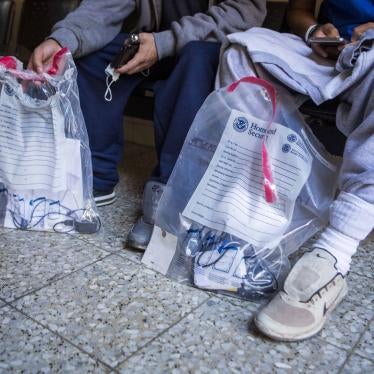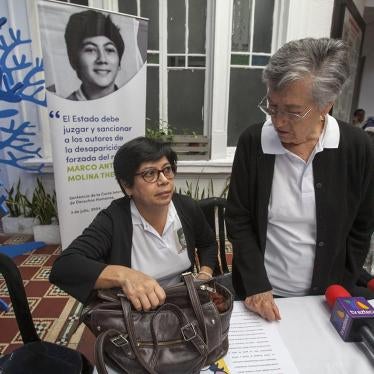(Washington, DC) – Members of Guatemala’s Congress should act swiftly to block the attempt by a number of lawmakers to remove the ombudsperson, Jordán Rodas, for supporting the rights of lesbian, gay, bisexual, and transgender (LGBT) people and access to abortion, Human Rights Watch said today.
On July 6, 2020, the legislature’s human rights commission summoned ombudsperson Rodas to a plenary session of Congress “to be held accountable for his activities in office and the actions taken during his tenure,” because of his public statements in support of LGBT rights.
“The fact that lawmakers want to remove the top human rights authority for doing his job reveals their lack of understanding of what protecting human rights means,” said José Miguel Vivanco, Americas director at Human Rights Watch. “Dismissing ombudsperson Rodas for showing a commitment to protect the rights of minorities and women would be a serious setback for Guatemala.”
In June, the Human Rights Ombudsperson’s Office (Procuraduría de los Derechos Humanos, or PDH) used the rainbow flag on social media to commemorate Pride month, celebrated internationally in June to honor the start of the modern LGBT rights movement. The office also released videos calling on the government to fulfill its international obligation to prevent anti-LGBT violence and discrimination, including in access to education and employment.
The legislature’s human rights commission scheduled the session with ombudsperson Rodas in response to a letter by Lucrecia Marroquín de Palomo, a member of Congress, in which she described the ombudsperson as an “LGBT influencer” who shows a “dangerous deference” toward a minority movement with which he sympathizes. The Guatemalan Chamber of Education, an association of private education centers, also evoked homophobia in condemning the social media posts from the ombudsperson’s office, alleging that they “conflict” with family values.
Ombudsperson Rodas has urged the State to comply with international recommendations on sexual and reproductive rights through official documents and social media posts. Lawmaker Marroquín de Palomo and organizations such as the Family Matters Association (Asociación la Familia Importa, or AFI) have also asked the congress to dismiss ombudsperson Rodas, contending that he has failed to comply with a 2017 Supreme Court ruling that orders his office to refrain from carrying out any activity that supports or promotes abortion, presents abortion as a right, or promotes its legalization. The ruling contravenes international human rights standards on sexual and reproductive rights, and unnecessarily and improperly restricts the ombudsperson’s ability to speak on matters of crucial national importance and to do his basic job of protecting and promoting human rights.
Ombudsperson Rodas was elected by Congress in 2017. To dismiss him, two-thirds of the total number of lawmakers – 107 out of 160 – must vote in favor of removing him from office.
Congress has tried to remove ombudsperson Rodas twice before, once in 2018 for participating in a peaceful feminist march, and again in 2019 for allegedly failing to comply with the Access to Public Information Law. Both attempts failed.
Guatemala has no comprehensive nondiscrimination legislation protecting LGBT people. This means that employers, landlords, health care facilities, schools, and other public and private institutions face no penalty for discriminating against LGBT people. There is also no law that allows transgender people to change their name and gender marker on official documents.
Lawmakers have attempted to undermine the rights of LGBT people, women, girls, and pregnant people. The 2017 “Life and Family Protection” bill, currently pending before Congress, would expand the criminalization of abortion, restrict comprehensive sexuality education, and prohibit same-sex marriage as well as opposite-sex marriage by transgender people.
The Inter-American Court of Human Rights has emphasized the role that government institutions should play in confronting discrimination, stating that states are internationally compelled to adopt the measures necessary “to make effective” the rights established in the American Convention on Human Rights. The UN Paris Principles provide that states should establish national human rights institutions to draw the attention of governments to situations in which human rights are violated, and “promote and ensure the harmonization of national legislation, regulations and practices with … international human rights instruments.”
|
News Release
Guatemala: Rights Official at Risk of Dismissal
Congress Attacks Ombudsperson’s Support of LGBT Rights, Abortion Access
Your tax deductible gift can help stop human rights violations and save lives around the world.
Most Viewed
-
November 25, 2019
A Dirty Investment

-
June 3, 2025
“They’re Ruining People’s Lives”

-
December 21, 2023
Meta’s Broken Promises

-
January 25, 2024
“We’re Dying Here”

-
February 19, 2018
“All We Want is Equality”





